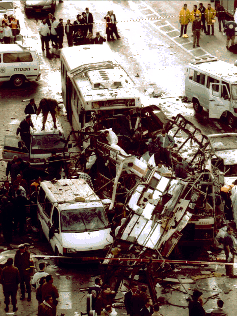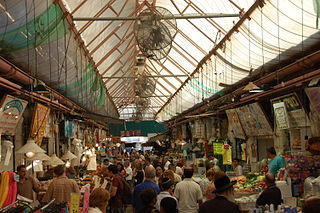Note: This compilation includes only those attacks that resulted in casualties. Attacks which did not kill or wound are not included.

The Passover massacre was a suicide bombing carried out by Hamas at the Park Hotel in Netanya, Israel on 27 March 2002, during a Passover seder. 30 civilians were killed in the attack and 140 were injured. It was the deadliest attack against Israeli civilians during the Second Intifada.

Female suicide bombers are women who intend to do suicide attack, wherein the bomber kills herself while simultaneously killing targeted people. Suicide bombers are normally viewed as male political radicals but since the 1960s female suicide attacks have been on the rise. Through 1985–2006, 15% of all suicide attacks were conducted by female suicide bombers. There are many organizations, such as Boko Haram, ISIS, and the Al Aqsa Martyrs Brigade, that recently started using women as tools in their attacks, since they are normally viewed as less of a threat than their male counterparts. This includes women having the element of surprise, a hesitancy to search females, increased publicity for female suicide bombing attacks, and the female stereotype as non-violent.

The Maxim restaurant bombing was a suicide bombing which occurred on October 4, 2003, in the beachfront "Maxim" restaurant in Haifa, Israel. Twenty-one civilians were killed and 60 were injured. Among the victims were two families and four children, including a two-month-old baby.
Ayat al-Akhras was the third and youngest Palestinian female suicide bomber who, at age 18, killed herself and two Israeli civilians on March 29, 2002, by detonating explosives belted to her body. The killings gained widespread international attention due to Ayat's age and gender and the fact that one of the victims was also a teenage girl.

A Palestinian suicide bombing at a pizzeria in downtown Jerusalem on 9 August 2001 killed 16 people, including seven children and a pregnant woman. A further 130 were wounded. The attack occurred during the Second Intifada.

Wafa Idris, a Palestinian Red Crescent volunteer, was the first female suicide bomber in the Israeli–Palestinian conflict. She killed herself while committing the Jaffa Street bombing. At the time of her suicide, Idris was a 28-year-old, divorcee, and lived in the Am'ari Refugee Camp in Ramallah.

Terrorist attacks were carried out on two No. 18 buses on Jaffa Road in Jerusalem, in 1996. Hamas suicide bombers killed 45 people in the attacks, which were masterminded by Mohammed Deif, using explosives prepared by Adnan Awul. These two bombings, within a few days of each other, occurred during a Hamas offensive launched after the killing of Yahya Ayyash, which also included the French Hill neighborhood attack, a suicide bombing in Ashkelon, and a terrorist attack near Dizengoff Center in Tel Aviv.

The Café Moment bombing was a Palestinian suicide bombing of a coffee shop in downtown Jerusalem, that killed 11 Israeli civilians and left 65 others wounded. It was carried out on March 9, 2002, during the Second Intifada.
Events in the year 2004 in Israel.
Events in the year 2002 in Israel.
Events in the year 2001 in Israel.
Events in the year 2004 in the Palestinian territories.

A suicide bombing occurred on 12 April 2002 at a bus stop located at the entrance to the Mahane Yehuda Market, Jerusalem's main fruit and vegetable market. The site of the attack was chosen in order to cause maximum number of casualties. 6 civilians were killed in the attack and 104 were injured. The al-Aqsa Martyrs' Brigades claimed responsibility for the attack.

The 2002 Rishon LeZion bombing was a suicide bombing which occurred on 7 May 2002 at a crowded game club located in the new industrial area of Rishon Lezion, Israel. 16 people were killed in the attack and 55 were injured.
The Sonol gas station bombing was a double suicide bombing attack which occurred on October 27, 2002, near a Sonol gas station located at the entrance to Ariel, an Israeli settlement city in the West Bank. Three people were killed in the attack and approximately 18 people were injured. All of the fatalities were IDF reservists. Hamas claimed responsibility for the attack.

A suicide bombing took place on June 11, 2003, on Egged bus line 14a at Davidka Square in the center of Jerusalem. 17 people were killed in the attack and over 100 people were injured.

The Erez Crossing bombing was a suicide bombing which occurred on January 14, 2004, at the pedestrian/cargo terminal Erez Crossing located on the Israeli Gaza Strip barrier. Four Israelis were killed and 10 people, including four Palestinians, were injured in the attack.
Husam Badran is the former leader of Hamas’s military wing in the northern West Bank. He was the orchestrator of several suicide bombings during the Second Intifada with the highest number of fatalities including the 2001 bombing which resulted in the Dolphinarium discotheque massacre in Tel Aviv which killed 21 people. Currently Badran serves as the international spokesperson for Hamas using Twitter, Facebook, and news media to encourage Hamas militants to commit acts of political violence against Israelis and the Israeli government. He lives in Doha, Qatar.











